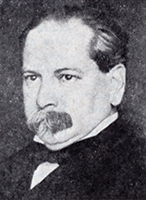|

Andrew Gray.
There were not many wireless engineers in Queen Victorias days, and still fewer who dated back to the 19th century part of the reign. One of that select band was Andrew Gray, formally chief engineer of the Marconi Co, whose recent death at the age of 80 we record with regret. Andrew Gray, who joined the Marconi Company in 1899 (two years after its formation), was sent by Marconi at the turn of the century to install the worlds first public telegraph service - between the islands of the Hawaiian group.
In 1901 he was appointed chief-of-staff of the company and was put in charge of both the training of engineers and the organization of the Marine Companys ship-shore installations. He was appointed chief engineer in 1910 and in 1928 became technical general manager.
G M Wright, the present engineer-in-chief of Marconis, writes:-
It is indeed sad to hear of the severing of another link with the early days of wireless by the death of Andrew Gray, who worked for some years as a personal assistant to Marconi. He had previously served with the West India and Panama Telegraph Company as chief electrician and so brought to the rapidly developing art of wireless communication an invaluable background of practical telegraph experience.
The time of his early work saw the development of wireless in the form of ship installations, coast stations, and later high power point-to-point telegraph services, in all of which he played a most important part.
One of his major contributions was the design of a steel mast which could be pressed in sections, easily transported and erected, under supervision, by local labour. These masts were erected in all parts of the world and became the familiar landmark of a Marconi station. When the new Marconi works was built at Chelmsford two Gray masts 450 feet high were erected on the site and gave invaluable help to the companys research work.
Andrew Gray had that rare combination of qualities which goes to make the great engineer. He had a deep knowledge of his specialized branch of engineering, supported by a wide general technical background. Above all, he possessed the virtue of common-sense. He took deep interest in research and experiment and encouraged research engineers by his personal advice in discussions of their problems. In the period from the end of the first war until his retirement in 1932 he paid a visit at least once a week to the companys research department in order to keep in close touch with all that was going on, and to discuss problems.
He was a man of a most lovable character and his staff always took their personal troubles to him and never left without advice and help. Those who knew and worked with him will learn of his death with a deep sense of personal loss, and regret that he is no longer with us.
|